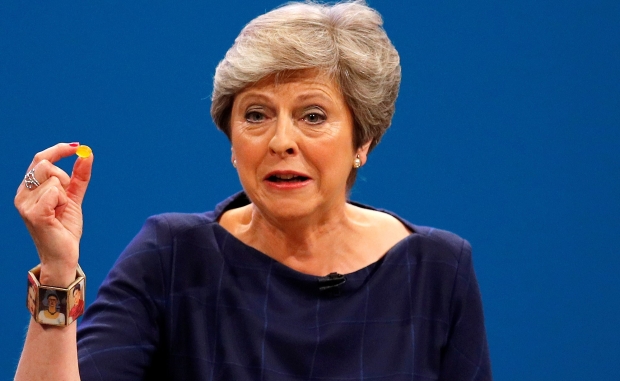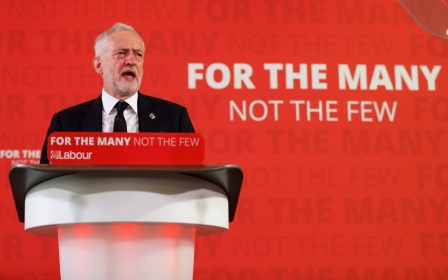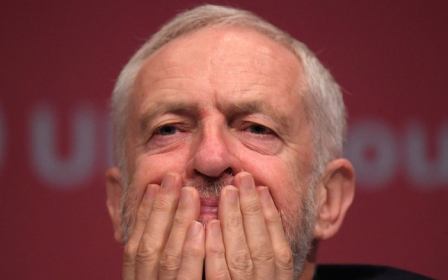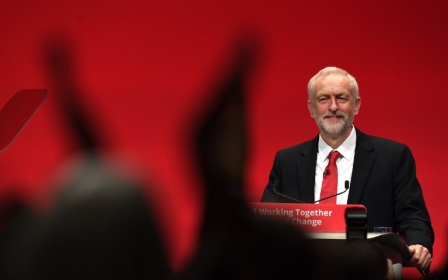Labour, Conservatives and the quest for a Palestinian state
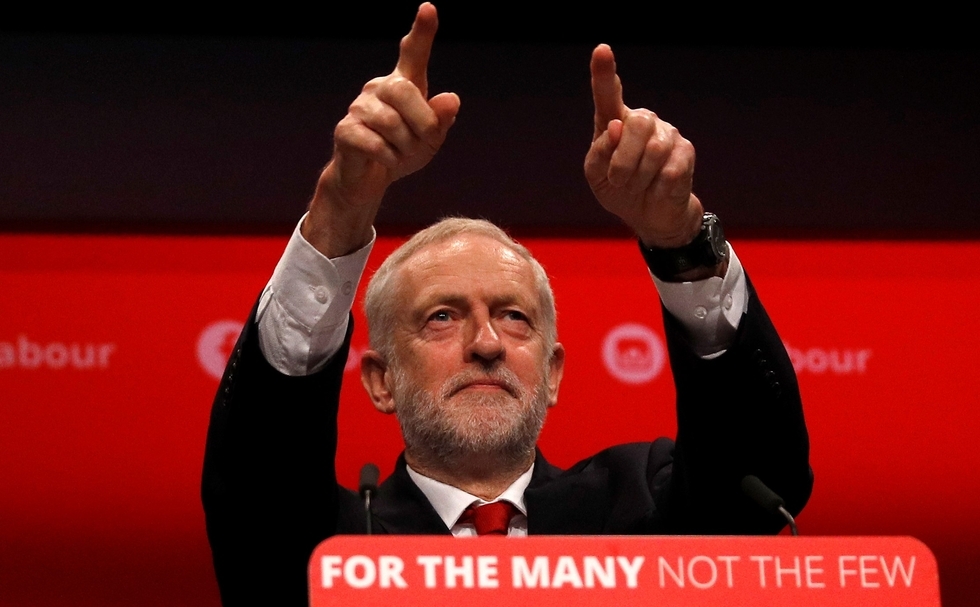
The annual conference season for the political parties in the UK has been in full swing. The Labour Party held what has been widely reported as a highly successful conference last week.
In contrast to Labour’s conference, the Conservative conference has been widely reported as lacklustre. Labour leader Jeremy Corbyn was the star in Brighton, where the conference was held, while in Manchester, Prime Minister Theresa May was looking over her shoulder at possible rivals for her job.
Britain’s foreign secretary, Boris Johnson, seen as her main rival, made a typically rousing speech in which he talked up Britain’s standing in the world and how it will succeed in going global post-Brexit. Though his subsequent comments on Libya once again brought calls for him to be dismissed.
The Palestinian-Israeli conflict did not figure in his remarks.
Speaking to Israel supporters
It was left to the government's international development secretary, Priti Patel, to criticise the Labour leader for failing to condemn the "terror his friends in Hamas have unleashed upon the Israeli people and not once did he condemn or confront his supporters who have launched a wave of anti-Semitism, bullying and abuse against anyone who does not subscribe to their extremist views".
The Labour leader’s two-year silence on the Palestinian issue can reasonably be attributed to the vicous attack Corbyn has faced since his election at the hands of the pro-Israel lobby both within and outside the party
It sounded as if she was only addressing pro-Israel supporters in the conference hall rather than offering a way forward. May also accused Corbyn of "allowing anti-Semitism and misogyny run free in his party". Again no mention of Palestinian suffering at the hands of Israel.
In his keynote speech, Corbyn, a long-standing campaigner for human rights, said: “We must put our values at the heart of our foreign policy. Democracy and human rights are not an optional extra to be deployed selectively.” And while he criticised Saudi Arabia and Myanmar for human rights abuses he added that: "We should stand firm for peaceful solutions to international crises."
While such words are popular with his audience, the biggest cheer on foreign policy issues, however, came when he broke a two-year silence on the Israeli-Palestinian conflict by appealing to the conference "to give real support to end the oppression of the Palestinian people. The 50-year occupation and illegal settlement expansion and move to a genuine two-state solution to the Israel/Palestine conflict."
Although this appeal cheered the Palestinians and their sympathisers, it did not, however, go down well with the ardent supporters of Israel within the party. However, both sides must have noted that he omitted from his speech an important promise made in the now famous Labour manifesto. It committed a Labour government "to immediately recognise the state of Palestine”.
Recognising Palestine as a state is a tangible action that a Labour government can take to demonstrate its commitment to support the Palestinians and their rights, a move which the Conservatives refuse to take. Recognising Palestine also would simply be implementing a decision taken by the British Parliament in 2014 following the Israeli war on Gaza.
The Labour leader’s two-year silence on the Palestinian issue can reasonably be attributed to the vicious attack he has faced since his election at the hands of the pro-Israel lobby both within and outside the party.
The prospect, though judged unrealistic at the time of his election as leader in 2015, of a committed supporter of Palestine and equally outspoken critic of Israeli policies entering 10 Downing Street as British prime minister sent the pro-Israel lobby into panic mode.
The definition of anti-Semitism
Accusations of major anti-Semitism in the party were made. In response, Corbyn immediately commissioned an inquiry into anti-Semitism charges appointing respected lawyer and human rights campaigner Shami Chakrabarti to lead it. The inquiry concluded: "The Labour Party is not overrun by anti-Semitism, Islamophobia or other forms of racism."
The inquiry and subsequent report were not adequate as far as the pro-Israel lobby was concerned. The lobby's response was to conflate anti-Semitism with criticism of Israel.
A new definition of anti-Semitism, that went beyond the widely understood accusation of "hatred of Jews because they are Jews" was needed to shield Israel from criticism. This came in the form of the International Holocaust Remembrance Alliance (IHRA). Issues related to Israel figure prominently in the examples given by the IHRA to explain the definition, thus making it possible to accuse critics of Israeli policies of anti-Semitism.
The pro-Israel lobby becomes the gatekeeper on what is acceptable criticism and what crosses their lines
This definition was adopted by the government, the Labour Party and a number of local authorities. It is now being used regularly to throw accusations of anti-Semitism around despite a legal opinion which described it as “unclear and confusing and should be used with caution”.
The Jewish Labour Movement (JLM) and Labour Friends of Israel (LFI) are two organisations that work within the Labour party to influence its policy in support of Israel. LFI members were furious that the Labour leader did not address their fringe.
This year the JLM proposed a rule change that will tighten explicitly the party’s stance towards members who are anti-Semitic or use other forms of hate speech, including racism, Islamophobia, sexism and homophobia. The rule change was adopted, with the pro-Israel Jewish Chronicle reporting: "The changes mean Labour members could face expulsion and other punishments for Jew-hate."
However, the rule change means the IHRA definition could be used to accuse individuals criticising Israel of anti-Semitism and they could then be suspended or expelled. The pro-Israel lobby becomes the gatekeeper on what is acceptable criticism and what crosses their lines.
However, the rule change did not go unchallenged.
The emergence of a new group, the Jewish Voice for Labour (JVL), representing Jewish socialists who support Palestinian rights, provided some pushback against the pro-Israel lobby in the party.
Two of its members spoke against the rule change but more significantly spoke for parts of British Jewry that the JLM cannot claim to represent. The importance of the emergence of JVL cannot be overemphasised. In future, the Labour Party cannot develop policy that might impact on British Jews or policy on Israel and only speak to the JLM. This should bring a fairer representation of Jewish views than in the past.
As the 2017 conference season ends, the Conservatives continue with business as usual in supporting Israel and paying lip service to the suffering of the Palestinians, while there is hope that a Labour government would act to support the Palestinians in their quest for justice and freedom. For Palestinians that cannot come quickly enough.
- Kamel Hawwash is a British-Palestinian engineering professor based at the University of Birmingham and a longstanding campaigner for justice, especially for the Palestinian people. He is vice chair of the British Palestinian Policy Council (BPPC) and a member of the Executive Committee of the Palestine Solidarity Campaign (PSC). He appears regularly in the media as commentator on Middle East issues. He runs a blog at www.kamelhawwash.com and tw
The views expressed in this article belong to the author and do not necessarily reflect the editorial policy of Middle East Eye.
Photo: Britain's opposition Labour Party leader Jeremy Corbyn acknowledges his audience prior to giving his keynote speech at the Labour Party Conference in Brighton, Britain, September 27, 2017 (Reuters)
New MEE newsletter: Jerusalem Dispatch
Sign up to get the latest insights and analysis on Israel-Palestine, alongside Turkey Unpacked and other MEE newsletters
Middle East Eye delivers independent and unrivalled coverage and analysis of the Middle East, North Africa and beyond. To learn more about republishing this content and the associated fees, please fill out this form. More about MEE can be found here.



